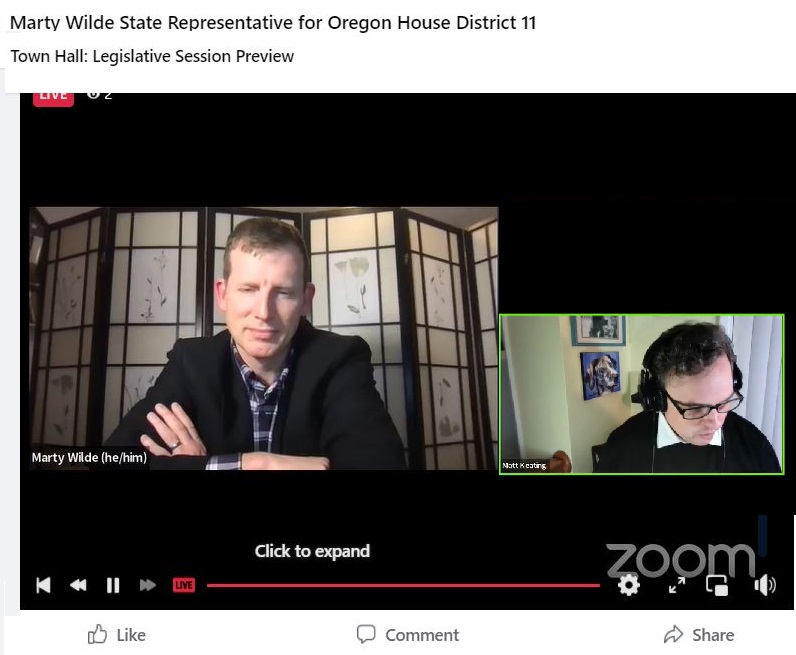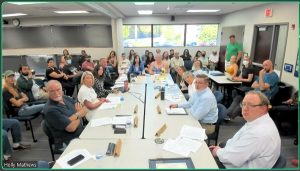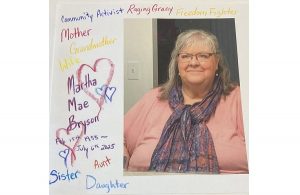Rep. Marty Wilde offers preview of 2022 special session
8 min read
Radio personality Matt Keating hosted Rep. Marty Wilde in a preview of the upcoming short session.
In the upcoming short session, Rep. Marty Wilde talked about some of the bills he is watching.
[00:00:05] Rep. Marty Wilde: Rep. Jami Cate from the district just north of mine has two bills I liked. One is a tax credit for rural fire fighters, rural fire volunteers. Not every city is blessed to have a full-time professional firefighting force. And so a lot of them rely on especially rural areas, rely on fire departments with a lot of volunteers. But it’s a fairly serious commitment obviously to be safe and we want to make sure that they’re at least somewhat compensated for their time. And there are some just participation requirements to get the $1,000 tax credit, but it seems one way we can encourage people to serve their communities. So that was the first one from Jami Cate that I really liked.
[00:00:39] She also was seeking to address a bill we passed through the House last time that didn’t get through the Senate. Oregon is one of the only states that doesn’t have an impeachment process for the governor. We do actually have a recall process, but sometimes bad things happen and a governor might need to be removed quickly, and the way to do that would be through a legislative impeachment. The other bill I signed on with Jami Cate was a referral to the voters to amend Oregon’s constitution to provide for an impeachment process for the governor—any governor in the future that might run into that kind of problems. It would require a supermajority, obviously, I think three-fifths in the House and two-thirds in the Senate.
Thank you for supporting
local citizen journalism
[00:01:12] Anna Scharf is one of the newer representatives. She took on Mike Nearrman’s place when we expelled him last session. She has a lot of rural area as do I, and so we’ve been talking about the plight of small rural pharmacies. A lot of towns have small pharmacies and they’ve really had some trouble lately, as it turns out. While clearly some people are making money in pharmaceuticals, it’s not your neighborhood pharmacy. And so we, to fund schools, we started the Student Success Act, which has a commercial activities tax as the funding mechanism. And we are looking at exempting pharmacies from it or giving them what we call higher exemption.
[00:01:49] I think that’s important for some of our smaller towns to preserve access to a pharmacy. I think the reason I haven’t signed on fully is that Rep. Scharf’s bill does not replace that revenue, which the schools desperately need, but assuming we can find a way to replace that revenue for the schools, that’s something I would support.
[00:02:05] Duane Stark was my neighbor on the same hallway and the state representative from the Grants Pass area. And he had a legislative assistant and she did everything her insurance company could have wanted for the birth of her first child. And when she went into labor, they went to the hospital that was in-network and everything, and they got there and they waited. And finally the hospital said, you know, ‘We’re filled up with COVID patients, we’ve got to send you a different hospital.’ So fortunately for them, they got safely to the other hospital and the delivery was uneventful until the bill came and they said, ‘Well, you were at an out of network hospital.’ Yeah, of course she was because she couldn’t be at the in-network hospital! What we’re trying to do, I’m happy to be a co-sponsor on this, is make sure that if you are transferred involuntarily between hospitals, that you’re not paying more because you did everything they could have asked.
[00:02:48] Last session, I co-sponsored a bill with Rep. Rick Lewis about that would have just required the governor to call the legislature back into session every time she extended a state of emergency. Rep Owens is looking at something similar. He’s not quite to where I can agree with him, but we’re getting there. I think we both want to make sure that the legislature stays active during emergencies. You know, the voters in Oregon in 2012 passed a constitutional amendment and we passed the implementing legislation to give the governor some (emergency) powers, but nobody really during emergencies, but nobody really anticipated that it would go on for quite this long. So I think we’re looking to tweak those to make sure that the other branches play an appropriate role in any future emergency.
[00:03:27] Rep. (Christine) Goodwin, a new representative from Roseburg, takes the place of my late friend, Gary Leaf. She has a bill I hadn’t thought of it, I’m a little ashamed I haven’t. Occasionally the sad reality is that veterans die without family and without someone to take care of their remains. And so she has a bill that will help the county Veteran Service Officers have a dignified interment for those deceased veterans in national cemeteries. So I think that’s a really critical step.
[00:03:52] Sen. Bill Kennemer, a Republican, there’s something called the Newberg Pool and it’s a stretch of river along the Willamette River. You know, the problem is, it’s a long linear stretch, right? And so people like to do wakeboarding there. But what you really need is a big, rounder lake, because then the energy of the waves is dissipated. The problem we’re having in the Newburg Pool is the boats are so heavy and move so fast—in fact, they deliberately pump ballast water in to make themselves heavier—that they’re swamping docks, they’re damaging things, the banks, they’re damaging property. And Bill and I are working on a bill to make sure that that these things are done in appropriate areas and not damaging other people.
[00:04:31] Radio Personality Matt Keating: You’re working LC 262, cracking down on illicit marijuana farms. You want to give us a snapshot about—
[00:04:39] Rep. Marty Wilde: Sure! The feds in 2018 decided, oh, we’re not going to legalize marijuana, but we’re going to legalize the growth of hemp, which is, you know, the same plant with less intoxicating compounds.
[00:04:48] And so you grow it for food or grow it for fiber. So what’s happened is, roughly half the people who are growing hemp are actually growing marijuana, and not only putting our legal marijuana system at risk but it’s putting the legitimate hemp growers at risk.
[00:05:02] And it’s creating unfair competition for the people who are doing everything right in terms of their compliance with the marijuana system. This bill also helps with the victims of the organized crime that surrounds these illegal grows. There’s a lot of people being trafficked for labor.
[00:05:17] And so we proposed to spend $2 million through grants to help those victims. We call it house bill 3000 part two, or ‘The Illegal Grow Fix.’
[00:05:25] Radio Personality Matt Keating: And you have a bill, I believe it’s LC 186 that is about equity in the courts.
[00:05:33] Rep. Marty Wilde: The Ahmaud Arbery murder, where a black man was innocently running in a neighborhood, the wrong neighborhood, according to the three white men, who frankly hunted him down and killed him.
[00:05:42] When it went to. a trial, finally the defense kicked 11 of the 12 black potential jurors off the panel. And under Georgia law, which is the same as Oregon law, you really have to only have what’s called “an articulable reason.”
[00:05:56] So the judge in that case expressed a lot of frustration, but the law really limited what he could do about it. I think that was unjust. And so we’re working on a standard that, if you want to kick somebody off a jury, you have to have an objectively reasonable reason for doing so.
[00:06:08] Radio Personality Matt Keating: This next question comes from constituents who sing your praises often from the Southeast Neighborhood Association. Devon and Dennis asked about the voter-approved measure decriminalizing drugs in 2020. Since then, there appears to be a rampant rise in methamphetamine and opioid abuse resulting in increased crime. What opportunities exist to provide treatment for addicts and what resources does the state supply cities and municipalities to combat the rise of debilitating drug abuse in our community?
[00:06:48] Rep. Marty Wilde: Frankly, the measure decriminalized things pretty much right away, but the capacity building, the revenue that has to come in, and the capacity building in addiction and recovery just takes longer to build and so that’s the gap you’re seeing right now.
[00:07:03] I mean, just a mismatch between the timing of the decriminalization and the timing of the new services coming online. So I’ve got some hope for the future. We have made record investments in addiction and recovery but we’re just not there yet.
[00:07:14] One of the hard things is finding out the right ways to spend the money to get where we need to go. And obviously that’s going to be in a range of services. You know, what works for somebody doesn’t work for another, I think there’s a big role for sober living facilities, like Oxford houses. And I think there’s a lot of roles for inpatient, intensive outpatient treatment for people who are in the thing. But do I get it? Yeah. These people, they’re at their wits’ end, their relatives are just exhausted. But we have to be thoughtful about the way we approach things and spend dollars efficiently. So I think we’re getting there. I think the hard part is going to be honestly telling some people that we’re not going to fund your program because it doesn’t have the outcomes that we need to see.
[00:07:51] And I think I am very pleased that we’ve been able to do more in the behavioral health and addiction recovery specifically. It’s just taken a lot longer than I hoped.
[00:08:00] Radio Personality Matt Keating: You spoke earlier about issues that Oregon voters overwhelmingly support. One of those issues is campaign finance reform leveling the playing field for everyday Oregonians to participate in the political process.
[00:08:14] Rep. Marty Wilde: We had a bill last time, and I hear that there’s a bill in the Senate this time. So, we’re working on it, I really wish we pass something. This session, I expect that we’re not going to be able to, the differences are just too great between the different sides of things. I expect you will see at least one and probably two, maybe even three versions of campaign finance reform on the ballot in November of 2022. So I hope you’ll vote yes on at least one of them.
[00:08:38] If we don’t get it done, you should absolutely do that. And engage. I would say also, the flip side of that is if we’re going to do these voter-financed elections you know, stay engaged. You know, if you got five bucks, give a candidate five bucks and that’ll really help.
[00:08:52] John Q: Check Rep. Marty Wilde’s Facebook page for the hour-long Town Hall.



